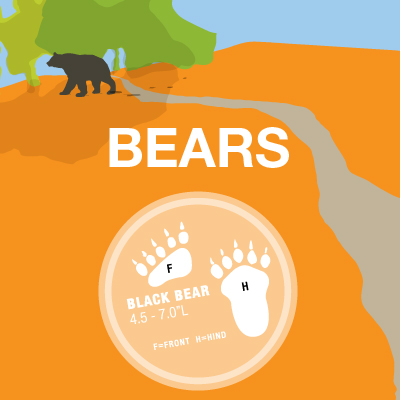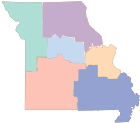 A Fed Bear is a Dead Bear
A Fed Bear is a Dead Bear
Bears have long been a symbol of the wilderness qualities that we value. The remarkable sense of smell that leads them to nuts, berries and honey can also lead them to human foods. Campers' coolers, garbage left in the open, and food scraps thrown on the ground or in the fire can draw bears to an easy meal. When bears associate humans with food, they lose their natural fear of humans and leave the safety of the backcountry.
Wild bears live longer and are healthier than bears that have adapted to feeding on garbage. Help keep Missouri’s bears wild by keeping a clean camp, by storing food properly, and by never feeding bears.
Report all bear damage and nuisance incidents to park staff immediately.
Black Bear Facts
Size: Adult black bears will average 3 feet tall at the shoulder, and between 5 and 6 feet tall when standing on their hind legs. Adult females can weigh up to 200 pounds; males can reach as large as 500 pounds.
Life span: approximately 20 years
Eyesight: similar to a human’s
Sense of smell: excellent
Food: Like humans, black bears are omnivores – they eat both plants and animals. Most of a bear’s diet is plants such as bulbs, berries, nuts and acorns. They also eat insects, small mammals, honey and carrion.
Agility: Bears are very agile. They can run at speeds of 30 to 35 miles per hour, climb trees and are excellent swimmers.
Behavior: When a bear huffs or “woofs,” clacks its teeth, growls or slaps the ground, it is warning you that you are too close. Back away slowly and be sure the bear has a clear escape route. When a bear stands on its hind legs, it is trying to see or smell better.
Winter dens: Black bears find a den and enter long periods of sleep when cold weather comes. In Missouri, bears might use cavities in rocks, hollow trees and even piles of brush for their winter den.
Cubs: Cubs are born during their mother’s winter sleep. The cubs will stay with their mother for about 18 months or until she mates again. Mother bears are very protective of their cubs.
10 ways to help you SHARE the park with bears
Black bear populations in Missouri are increasing and this gives visitors to Missouri state parks a new opportunity. Viewing black bears in the wild can be a very enjoyable experience when a few basic precautions are followed. To safely share the park with bears, please:
1. Enjoy observing bears from a distance through binoculars or a spotting scope. Black bears are wild animals and can be dangerous. Do not try to approach them.
2. Keep a clean camp. Wash all plates, utensils, pots and pans immediately after use.
3. Put all garbage and trash in trash cans or dumpsters. Never throw garbage on the ground or into campfires.
4. Store all food in your trailer, RV or your car. If you are backpacking or traveling on a motorcycle or bicycle, hang all food from a tree limb to keep it out of reach of bears. Even items such as chewing gum, toothpaste or soap can smell like food to a bear.
5. Do not feed bears. Feeding bears causes them to lose their fear of humans. Garbage can kill bears when they ingest plastic and other food packaging.
6. Keep your dog on a leash.
7. When hiking, stay on the trail and keep your group together.
8. Make your presence known. Normal trail noises will let bears know you are coming. Most bears will avoid humans when given the chance.
9. If a bear comes into your camp, or you surprise one while hiking, do not run. Slowly back away and watch the bear without making direct eye contact. Leave the bear an escape route. If the bear does not leave, make loud noises by banging on pots and pans and yelling.
10. If a bear should attack, fight back. Hit the bear in the nose and eyes. Kick the bear as hard as you can. Use any available objects.






